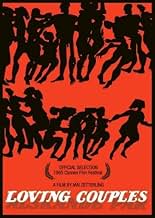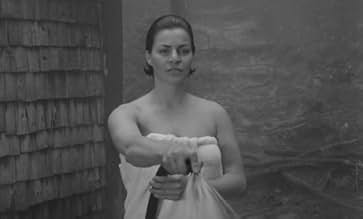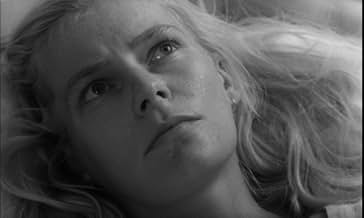Füge eine Handlung in deiner Sprache hinzuThree expectant mothers think back over their sex lives.Three expectant mothers think back over their sex lives.Three expectant mothers think back over their sex lives.
- Regie
- Drehbuch
- Hauptbesetzung
- Auszeichnungen
- 1 Nominierung insgesamt
Jan-Erik Lindqvist
- Peter von Pahlen
- (as Jan-Eric Lindquist)
Empfohlene Bewertungen
A cynical view of marriage and love relationships in Sweden in 1914. In a totally patriarchal society women are left to use sex and motherhood as a form of power, which effectively gives them a substantial slice of influence but does not bring them any happiness.
If women's destiny is to seek love, as one of the characters says, we don't see it at all in this film. It is forbidden to them by the established social model.
Due to Nykvist's beautiful cinematography and a lot of excellent actors that we are used to see in Bergman's movies, this would even seem, at first glance, to be a film by this director. But, unlike Bergman, who always imprints a strong ethical sense on his stories, here we are at the opposite end of the spectrum, a complete cynicism when it comes to human and social values. This is a real world, a dog world and not a principled world.
A pleasant surprise.
If women's destiny is to seek love, as one of the characters says, we don't see it at all in this film. It is forbidden to them by the established social model.
Due to Nykvist's beautiful cinematography and a lot of excellent actors that we are used to see in Bergman's movies, this would even seem, at first glance, to be a film by this director. But, unlike Bergman, who always imprints a strong ethical sense on his stories, here we are at the opposite end of the spectrum, a complete cynicism when it comes to human and social values. This is a real world, a dog world and not a principled world.
A pleasant surprise.
Technically speaking, this is a good film--with decent cinematography and production values. But, while it is a competent film, I also found myself wanting to turn off the DVD repeatedly because I just didn't find myself at all interested. There are a variety of reasons, though the biggest of which is because it seemed as if I'd seen all this before in various Ingmar Bergman movies--in particular, THE BRINK OF LIFE ("Nära livet"--1958). Also , the angst and sense of isolation and fruitlessness of life was pervasive and just made me feel depressed. After watching this film, I could easily say that the overall message of the film is "life stinks and love is a sham,...then you die".
Now this does NOT mean that I think all movies must be upbeat or positive in tone--far from it. But even a grim movie can be great and compelling when you feel SOME connection to the characters. For example, I just recently saw De Sica's THE CHILDREN ARE WATCHING. It is a major tear-jerker and is the extremely sad story about the break up of a marriage and its impact on a child. BUT, I really cared about De Sica's characters and cared absolutely nothing for Zetterling's. Of the three women featured in the film, one was a lady of privilege with little depth or personality, one a bubble-headed servant and the other a bitter and nasty soul. I just wanted them all to go away and leave me alone!
Now as for this being a controversial film--which it definitely was when it debuted in the 1960s. The nudity but especially the themes of homosexuality and lesbianism were pretty controversial for its day, though by today's standards it's all pretty tame. I still wouldn't let my kids watch the film, but not just because of the nudity and themes but because I love my kids too much to make them watch such an unappealing film.
Now this does NOT mean that I think all movies must be upbeat or positive in tone--far from it. But even a grim movie can be great and compelling when you feel SOME connection to the characters. For example, I just recently saw De Sica's THE CHILDREN ARE WATCHING. It is a major tear-jerker and is the extremely sad story about the break up of a marriage and its impact on a child. BUT, I really cared about De Sica's characters and cared absolutely nothing for Zetterling's. Of the three women featured in the film, one was a lady of privilege with little depth or personality, one a bubble-headed servant and the other a bitter and nasty soul. I just wanted them all to go away and leave me alone!
Now as for this being a controversial film--which it definitely was when it debuted in the 1960s. The nudity but especially the themes of homosexuality and lesbianism were pretty controversial for its day, though by today's standards it's all pretty tame. I still wouldn't let my kids watch the film, but not just because of the nudity and themes but because I love my kids too much to make them watch such an unappealing film.
There is no doubt that the Swedish actress Mai Zetterling, in her feature-length directing debut, had Ingmar Bergman in her mind: the cast is full of Bergman veterans, the cinematography is by the emblematic Bergman collaborator Sven Nykvist, and the whole style of the movie is modelled on her famous compatriot. Technically, the imitation is accurate: the film is well-made, the acting is fine, and I liked how Zetterling contrasted three different types of women - one happy all the time, one never happy, one somewhere in between. But the stories are too long and meandering, and for a movie so heavily dependent on flashbacks (about 80% of the running time), the flashbacks themselves are not especially revealing. **1/2 out of 4.
Three women at a lying-in hospital reflect on how they got there in Mai Zetterling's first feature as a director.
I was surprised at how Bergmanesque this movie was, although not as overtly cerebral. Of course a good deal of that can be attributed to the presence of Harriet Anderson, one of Bergman's frequent leading ladies, and Sven Nyquist being the cinematographer; but while it looks like a duck and walks like a duck, it doesn't quack like a duck. Instead of Bergman's meditation on keeping society going in a G*dless universe, it considers woman's place in a society run for the benefit and pleasure of its men; and the continuation of society depends more on popping out babies, a process which the women don't have on their minds when they get pregnant. Bergman may mourn the absence of G*d, but to Zetterling, He's irrelevant.
I was surprised at how Bergmanesque this movie was, although not as overtly cerebral. Of course a good deal of that can be attributed to the presence of Harriet Anderson, one of Bergman's frequent leading ladies, and Sven Nyquist being the cinematographer; but while it looks like a duck and walks like a duck, it doesn't quack like a duck. Instead of Bergman's meditation on keeping society going in a G*dless universe, it considers woman's place in a society run for the benefit and pleasure of its men; and the continuation of society depends more on popping out babies, a process which the women don't have on their minds when they get pregnant. Bergman may mourn the absence of G*d, but to Zetterling, He's irrelevant.
Both in the ambiance and in its women's themes in this movie you can see unequivocally Bergman's influences. In particular It recalls Bergman's SECRETS OF WOMEN (1952)for the cast ( It's almost the same!)and for its episodic structure. The psychological search on women universe is another important link.
Anyway, although Mai Zetterling had abused it in her movies, I think that the flashback use is very interesting in this movie. It becomes, with the editing help, a concrete tragic matter and not only a way to tell the story. I give it a 6.
Anyway, although Mai Zetterling had abused it in her movies, I think that the flashback use is very interesting in this movie. It becomes, with the editing help, a concrete tragic matter and not only a way to tell the story. I give it a 6.
Wusstest du schon
- WissenswertesMai Zetterling's directorial debut.
- Zitate
Dr. Jacob Lewin: I can't do much unless you take your pants off and lie down.
- VerbindungenFeatured in Vielleicht bin ich wirklich eine Zauberin (1989)
- SoundtracksBagni di Lucca
Composed by Giuseppe Manente (1903)
Top-Auswahl
Melde dich zum Bewerten an und greife auf die Watchlist für personalisierte Empfehlungen zu.
- How long is Loving Couples?Powered by Alexa
Details
- Laufzeit1 Stunde 58 Minuten
- Farbe
- Sound-Mix
- Seitenverhältnis
- 1.66 : 1
Zu dieser Seite beitragen
Bearbeitung vorschlagen oder fehlenden Inhalt hinzufügen






































